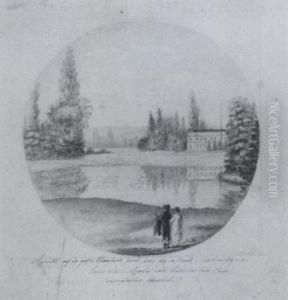Friedrich Ludwig Von Sckell Paintings
Friedrich Ludwig von Sckell is a pivotal figure in the history of European landscape architecture, whose work has left an indelible mark on the development of public parks and the English garden style in Germany. Born on September 13, 1750, in Weilburg, Nassau, Sckell came from a family with a strong background in gardening and landscape design, which undoubtedly influenced his career path. His early experiences and training under his uncle, a court gardener, laid the groundwork for his future achievements.
Sckell's professional journey took a significant turn when he traveled to England in the early 1770s. This period was crucial for his development as a landscape architect. England, during the 18th century, was at the forefront of a shift towards naturalistic landscape design, moving away from the formal, geometric gardens that were prevalent in Europe. Sckell absorbed these new ideas, which emphasized harmony with nature and picturesque beauty, and he would later introduce and adapt them to the German context with great success.
Upon his return to the German states, Sckell began to implement his vision. One of his most notable contributions was the transformation of the park at Nymphenburg Palace and the English Garden in Munich. The English Garden, in particular, is considered one of the first and largest public parks in Europe, showcasing Sckell's revolutionary approach to landscape design. His work there exemplifies the ideals of the English garden style—featuring winding paths, varied topography, and the careful placement of trees and water features to create a naturalistic, serene landscape.
Throughout his career, Sckell continued to influence landscape architecture in Germany and beyond. He was appointed as the Bavarian court garden director, a position that allowed him to oversee numerous projects and to impart his vision on a generation of landscape architects and gardeners. His approach to design, which emphasized ecological principles and the importance of public green spaces, was ahead of its time and continues to resonate in contemporary landscape architecture.
Friedrich Ludwig von Sckell passed away on February 24, 1823, in Munich. His legacy endures not only in the parks and gardens he designed but also in his forward-thinking approach to landscape architecture, which blended aesthetics, functionality, and ecological sensibility. Sckell is remembered as a pioneer who played a key role in the transition from formal baroque gardens to the naturalistic landscapes that characterized the Romantic era in Europe.


